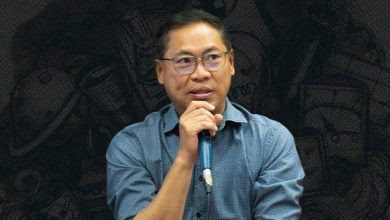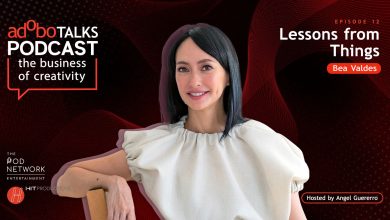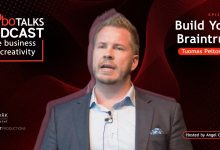SINGAPORE — Creativity and tech must intertwine for ad and media agencies to survive the future, according to S4 Capital Founder and Executive Chairman Sir Martin Sorrell. The advertising tycoon shared his thoughts on how exactly creative mindsets must change in order for these businesses to remain sustainable in an exclusive interview with adobo Magazine Founder, President, and Editor-in-Chief Angel Guerrero at the 2024 Spikes Asia Awards in Singapore.
“There are five things that are affecting our industry,” Sir Martin explained. “Visualization and copywriting, speeding that up; hyper-personalization [at a] greater scale; media planning and buying is going to be revolutionized and be reduced to an algorithm, so employment will shrink — for us it’s a major opportunity, and agencies will become more and more validators of what the platforms are implementing — and general efficiency […]. Last but not least, the fifth area, what I call ‘democratization of knowledge,’ spreads knowledge amongst everybody. Flattening organizations, making them more efficient, making people share more, which is critically important.”
To keep up with all five, creatives need to adopt a more tech-involved skillset and knowledge base. With technology driving forward massive shifts in the advertising industry at such a rapid pace, it only makes sense to make tech equal to creativity, despite what some agencies might think.
“Whether we like it or not, you know, ‘airy-fairy’ doesn’t work anymore,” he said.
“I think it’s not sufficient to understand strategic planning,” he continued. It’s not sufficient to be creative. It’s not sufficient to media plan and buy. You have to have very, very deep technological knowledge to understand what Apple is doing, what Microsoft’s doing, Nvidia’s doing, what Musk is doing, and what Amazon and Alphabet, Meta, Alibaba, Tencent, and Bytedance are doing with TikTok. You have to have deep tech.”
“Our people have deep technical knowledge that rivals the [media] platforms themselves. Many of our people come from the platforms, and they understand technology, so the skills that you need — you need to speak Spanish, you need to speak Chinese, you need to speak code — although AI can do that for you now — you have to have deep technical expertise. That’s the difference.”
Having this knowledge will also allow media agencies to develop the capacity for what Sir Martin believes will be a key role in an AI-driven advertising landscape: validating AI implementation. As algorithms develop to the point of sophistication where they can make intelligent suggestions on a brand’s media spend, agencies will need to step in to ensure that these recommendations are, in fact, worth pursuing in the first place.
“You wouldn’t give — no offense to Google and Meta — you wouldn’t give your media budget to them and say, ‘Go spend it on your property.’ You won’t do [this with] Google; you would ask a third party to validate that the investment that the algorithm is recommending is the right investment,” he said.
He added, “You’re confirming that the machine-based solution is accurate. It needs human input.”
At the same time, clients must focus on improving their agility in the face of this rapidly changing landscape. Having a foundation based on first-party data and overall data hygiene will tremendously impact businesses, determining their best operations models and creative options.
“In an era where there’s the deprecation of third-party cookies, and web content and content engines and ‘content factories’ if you like — creators will hate that word, but those are becoming more important in an increasingly technology-dominated world and first-party data becoming critically important in-house activity, or what I call ‘taking back control,’ becomes very important,” Sir Martin explained. “So the three messages for clients are. First, agility is key in a world that is so volatile. Secondly, you have to take back control — outsourcing willy-nilly, which people did after the great financial crisis in 2008, is not necessarily the way to go, [nor is it] perfect for everybody. And then the third is first-party data cleaning data in the context of operation is critical.”
“The old story in our industry was that people — Mad Men, thinking back to Don Draper — would say, you know, the data ruins creativity,” he added. “I think that’s nonsense, right? Data improves. If you think about the Netflix model, you have insights about consumers driven by first-party data and the signals from the platforms — from that, you get creative ideas, develop content at scale, personalize it, and it’s a loop.”
“So you don’t go out and film a perfect commercial for zillions over a three-month period. It’s an iterative loop where you devise a piece of content and see what [the audience’s] reaction to it is. If it’s not the right reaction in your mind, you feed [them] another alternative. So it’s continuous experimentation that informs creativity. It doesn’t destroy it. I don’t think technology or data is inimical to creativity; it could stimulate it.”








